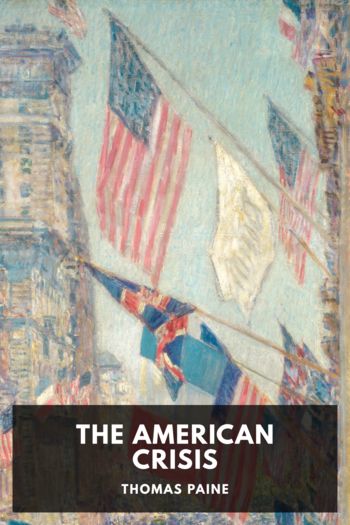The American Crisis, Thomas Paine [pdf to ebook reader TXT] 📗

- Author: Thomas Paine
Book online «The American Crisis, Thomas Paine [pdf to ebook reader TXT] 📗». Author Thomas Paine
You introduce your proclamation by referring to your declarations of the 14th of July and 19th of September. In the last of these you sunk yourself below the character of a private gentleman. That I may not seem to accuse you unjustly, I shall state the circumstance: by a verbal invitation of yours, communicated to Congress by General Sullivan, then a prisoner on his parole, you signified your desire of conferring with some members of that body as private gentlemen. It was beneath the dignity of the American Congress to pay any regard to a message that at best was but a genteel affront, and had too much of the ministerial complexion of tampering with private persons; and which might probably have been the case, had the gentlemen who were deputed on the business possessed that kind of easy virtue which an English courtier is so truly distinguished by. Your request, however, was complied with, for honest men are naturally more tender of their civil than their political fame. The interview ended as every sensible man thought it would; for your lordship knows, as well as the writer of the Crisis, that it is impossible for the King of England to promise the repeal, or even the revisal of any acts of parliament; wherefore, on your part, you had nothing to say, more than to request, in the room of demanding, the entire surrender of the continent; and then, if that was complied with, to promise that the inhabitants should escape with their lives. This was the upshot of the conference. You informed the conferees that you were two months in soliciting these powers. We ask, what powers? for as commissioner you have none. If you mean the power of pardoning, it is an oblique proof that your master was determined to sacrifice all before him; and that you were two months in dissuading him from his purpose. Another evidence of his savage obstinacy! From your own account of the matter we may justly draw these two conclusions: 1st, That you serve a monster; and 2nd, That never was a messenger sent on a more foolish errand than yourself. This plain language may perhaps sound uncouthly to an ear vitiated by courtly refinements, but words were made for use, and the fault lies in deserving them, or the abuse in applying them unfairly.
Soon after your return to New York, you published a very illiberal and unmanly handbill against the Congress; for it was certainly stepping out of the line of common civility, first to screen your national pride by soliciting an interview with them as private gentlemen, and in the conclusion to endeavor to deceive the multitude by making a handbill attack on the whole body of the Congress; you got them together under one name, and abused them under another. But the king you serve, and the cause you support, afford you so few instances of acting the gentleman, that out of pity to your situation the Congress pardoned the insult by taking no notice of it.
You say in that handbill, “that they, the Congress, disavowed every purpose for reconciliation not consonant with their extravagant and inadmissible claim of independence.” Why, God bless me! what have you to do with our independence? We ask no leave of yours to set it up; we ask no money of yours to support it; we can do better without your fleets and armies than with them; you may soon have enough to do to protect yourselves without being burdened with us. We are very willing to be at peace with you, to buy of you and sell to you, and, like young beginners in the world, to work for our living; therefore, why do you put yourselves out of cash, when we know you cannot spare it, and we do not desire you to run into debt? I am willing, sir, that you should see your folly in every point of view I can place it in, and for that reason descend sometimes to tell you in jest what I wish you to see in earnest. But to be more serious with you, why do you say, “their independence?” To set you right, sir, we tell you, that the independency is ours, not theirs. The Congress were authorized by every state on the continent to publish it to all the world, and in so doing are not to be considered as the inventors, but only as the heralds that proclaimed it, or the office from which the sense of the people received a legal form; and it was as much as any or all their heads were worth, to have treated with you on the subject of submission under any name whatever. But we know the men in





Comments (0)